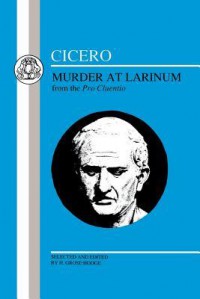Blinding the Judges

I have to admit that this is a pretty long speech, though I'm not entirely sure if it is the closing speech, the opening speech, or just the actual defence (namely because he does call for evidence to be presented to the court at least three times). Pliny apparently believes that it is his best, though I'm probably not going to argue with him, with the exception that Cicero seems to talk about anything but the innocence, or guilt, of Cluentius. In fact Cicero seems to spend an awful lot of time talking about corrupt judges and bribes amounting to the 100s of thousands of sesterices, which I have to admit is somewhat mind-boggling considering that the Romans didn't have paper currency but rather used minted silver, which means that we are talking about an awful lot of coins – in fact I once lugged $1000.00 worth of coins to the bank to deposit them and I have to admit that it was pretty heavy, which suggests that these guys were probably lugging the money around by wagonload (and these wagons must have been pretty heavily guarded).
Anyway, this is another case that involved the accused murdering his father, but it didn't seem to be as bad as the previous case Pro Sextus Roscius in this book since it wasn't his biological (or adoptive) father but rather his step-father, and it appears that the step-father isn't held in as high a regard as a biological (or adoptive, which are fairly much the same in the eyes of the Romans) father. Actually, this was he fourth father that Cluentius had, since it appears that his mother keeps on marrying other men, though it wasn't all that clear if the previous marriages had ended through the death of the husband, or just divorce (both of which is a distinct possibility during this period of Republican Rome). Also, the women, at least the noble born women, weren't as oppressed as they were in, say Ancient Athens, namely because they did become involved in political machinations.
What we get in this defence speech (as is similar to the previous case that I read) is a glimpse into the lives of the Roman upper classes. However times had changed since the trial of Roscius in that Sulla had died, and Cicero was now a praetor. In fact Cicero willingly stepped down from the role so that he could defend Cluentius. Maybe he saw this case as a challenge (and even today lawyers will willingly take of cases, even <i>pro bono</i> if the case proves to be one that is likely to increase their profile. In fact I wouldn't be surprised if you find a quarrel of lawyers milling around a court, all fighting to represent the defendant in a particularly high profile case. In fact in my younger years I remember a time when a friend of mine was brought up on charges and out of the blue this guy rocks up and told him that he was going to be his lawyer. However, while there are times when lawyers will all want to take a case, there are times when it is completely the opposite.
The tactic that Cicero uses in his defence speech is a tactic that is basically known as 'throwing sand in the eyes of the judges'. No doubt this is still used today, particularly in jury trials where a defence lawyer will point out the complexity of the case, and that the jury could have no way of being able to understand the law that applies, so they should simply find for the accused – and it works (though I wouldn't recommend trying it because you have to be a really good lawyer to pull this off, and juries aren't necessarily idiots, though it is interesting that if you have had legal training, or have worked in the legal fraternity, that you can actually get off sitting on a jury – it isn't actually all that much fun).
Even though Cicero seems to go all over the place in this defence speech (which he is doing on purpose mind you) as I have mentioned, we still get an interesting perspective of life of the upper classes during to fall of the Roman Republic. We have poisonings, bribery, corruption, and of course people being framed. Mind you, whether Cluentius is guilty or not is a moot point because it is not the job of the defence lawyer to get to the truth of the matter, but to rather prove to the court that his client is innocent of the charges put before him. This is why it is very important that the prosecution get their case right simply because if they charge the accused with the wrong charge then the case gets dismissed, and the rule of double jeopardy means that the accused cannot be tried for the same charge again. Ahh, technicality, such a beautiful word.
 4
4


